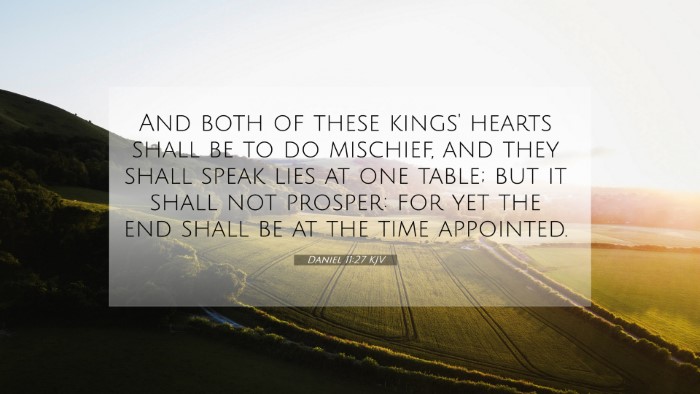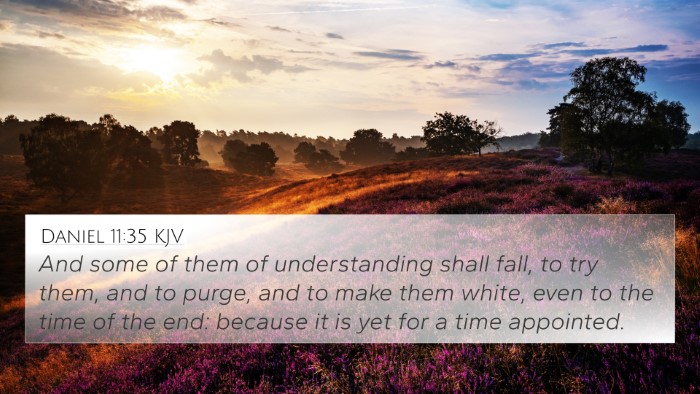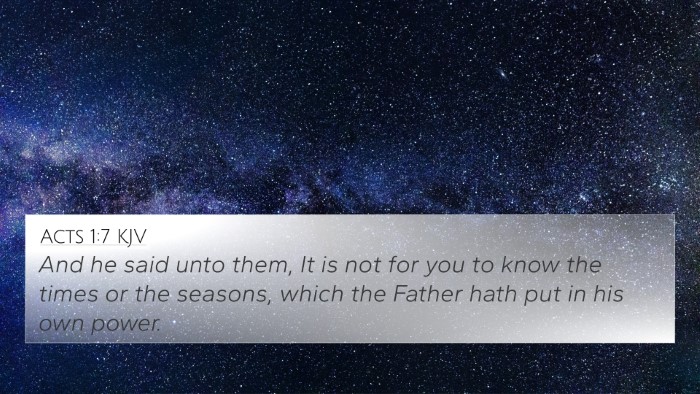Understanding Daniel 11:27
Daniel 11:27 reads: "And both these kings’ hearts shall be to do mischief, and they shall speak lies at one table; but it shall not prosper: for yet the end shall be at the time appointed." This passage is rich in prophetic meaning and its implications for understanding both historical and future events. Below is a comprehensive analysis based on insights from esteemed biblical commentators.
Context and Overview
The context of Daniel 11 presents a detailed prophecy concerning the conflicts between the kings of the North (typically associated with Syria) and the kings of the South (often identified with Egypt). This specific verse highlights the deceitful intentions of these rulers as they conspire against each other, while the ultimate fulfillment of God’s plan remains steadfast.
Key Themes
- Deception in Political Alliances: The verse highlights the nature of deceit in political affairs, as both kings are portrayed as scheming against one another even while appearing to be in alliance.
- Divine Sovereignty: Despite their plans, the commentary reinforces that their endeavors will not come to fruition, stressing God’s control over history and prophetic fulfillment.
- The Appointed Time: The assurance that "it shall not prosper" emphasizes that there is a time set by God for all events to culminate, which is a recurring theme throughout biblical prophecy.
Commentary Insights
Matthew Henry’s Commentary
Matthew Henry points out that this passage reflects the human propensity to plot against one another while attempting to maintain facades of unity. He emphasizes that both rulers are ultimately subject to a higher authority, and that their secret intrigues will be rendered ineffective.
Albert Barnes’ Notes
Albert Barnes elaborates on the use of the term “mischief” in this context, suggesting that it denotes a severe and detrimental kind of future conflict. He affirms that the verse serves as a reminder that political maneuvering often leads to bitter outcomes, and these rulers will face the consequences of their treachery.
Adam Clarke’s Commentary
Adam Clarke adds depth by noting the historical backdrop of these kings, indicating their eventual downfalls. Clarke emphasizes the prophetic significance that aligns this verse with broader themes of ultimate divine judgment and deliverance for God's people.
Cross References of Daniel 11:27
To provide a fuller understanding, we can identify several Bible verse cross-references related to this passage:
- Proverbs 12:5 - "The thoughts of the righteous are right: but the counsels of the wicked are deceit." This verse echoes the theme of deceit in political machinations.
- Isaiah 8:10 - "Take counsel together, and it shall come to nought; speak the word, and it shall not stand: for God is with us." This supports the idea that God thwarts the plans of the wicked.
- Psalm 33:10-11 - "The LORD bringeth the counsel of the heathen to nought: he maketh the devices of the people of none effect." This illustrates God’s sovereignty over human affairs.
- Jeremiah 29:11 - "For I know the thoughts that I think toward you, saith the LORD, thoughts of peace, and not of evil, to give you an expected end." This emphasizes the certainty of God’s plans compared to human plotting.
- Isaiah 14:24 - "The LORD of hosts hath sworn, saying, Surely as I have thought, so shall it come to pass; and as I have purposed, so shall it stand." This reaffirms God's ultimate dominion over worldly affairs.
- Revelation 17:14 - "These shall make war with the Lamb, and the Lamb shall overcome them: for he is Lord of lords, and King of kings." This connects to the ultimate triumph of God amidst human rebellion.
- Proverbs 21:30 - "There is no wisdom, nor understanding, nor counsel against the LORD." This serves as a reminder that no matter the political strategies devised, they will not succeed against divine will.
Thematic Connections
This verse serves as a focal point for several key themes in the Bible, revealing the connections between Bible verses that relate to each other. The themes of deception and divine intervention resonate throughout biblical texts:
- Deception: From the narratives of Joseph, where false accusations led to his imprisonment (Genesis 39), to the New Testament portrayals of deceitful tactics used against Jesus (Luke 20:20).
- God’s Sovereignty: Seen in the larger narrative of scripture, from the stories of the Kings of Israel to Jesus’ affirmation of God’s kingdom (Matthew 6:33).
- Ultimate Justice: The hope of justice is a consistent theme, particularly in prophetic literature (Isaiah 61:8), reinforcing the belief in a God who will ultimately set things right.
Practical Applications
Understanding Daniel 11:27 encourages us to:
- Be wary of political machinations in our own lives and recognize the nature of deceit.
- Trust in God's sovereign timing, especially when faced with chaotic or unjust situations.
- Engage in reflective study of the Scriptures, utilizing tools for Bible cross-referencing to deepen understanding.
Conclusion
Daniel 11:27 teaches us about the futility of human schemes against God’s predetermined plans. This verse, when explored through the lens of cross-referencing, enhances our understanding of the nature of divine sovereignty and the inevitable consequences of deceitful actions.
By recognizing these connections and implications, we can apply the wisdom contained within this passage to our own lives and societal contexts.
























